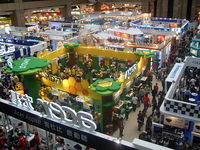Wikinews interviews Peter "Shamino" Tan from Singapore about overclocking
Monday, December 10, 2007
Last Saturday, the "Intel Taiwan Overclocking Live Test" took place in the Taipei World Trade Center in Taipei, Taiwan, which drew many spectators to come and see the hardware experts at work. Overclocking (running computer hardware at a higher clock rate than normally) is more of an enjoyment for senior gamers or engineers, while the average computer users may lack the basic concepts of it, causing hardware to halt when they attempt it.
With those issues in mind, Wikinews freelance reporter Rico Shen interviewed Peter "Shamino" Tan, an overclocking expert from Singapore, to clear up some of the basic issues relating to overclocking.
Interview

Image: Rico Shen.
![]() ((Rico Shen
((Rico Shen![]() )) It was nice to witness this overclocking festival, and this is my second time after I saw an overclocking test at 2007 COMPUTEX Taipei. What portion of the computing population most often try to overclock their computers?
)) It was nice to witness this overclocking festival, and this is my second time after I saw an overclocking test at 2007 COMPUTEX Taipei. What portion of the computing population most often try to overclock their computers?
Shamino: Generally, gamers often try overclocking because several games perform best when graphics display and computing are at optimal conditions. They needs high-level hardware to fulfill the requirements of those games. But some senior engineers also try overclocking tests to examine performance on newly-developed hardware before marketing it. Roughly speaking, any user who understands hardware functioning may experiment with overclocking.
![]() ((RS
((RS![]() )) I remember that in a conference, an expert recommended engineers to be cautious for safety reasons, why is that?
)) I remember that in a conference, an expert recommended engineers to be cautious for safety reasons, why is that?
Shamino: If someone wants to try overclocking, all hardware should be waterproof and safety is a paramount issue that experts should be concerned about. If they know the risks and can afford the results of overclocking, then the public can rely on those experts when they do overclocking.

Image: Rico Shen.
![]() ((RS
((RS![]() )) Which software is recommended when overclocking hardware?
)) Which software is recommended when overclocking hardware?
Shamino: 3D Mark, CPU-Z, PCMark05, SysTool, CPUCool, and CPUIdle are often used for overclocking, but it depends on the individual users to make their own decisions. Generally, most experts recommend 3D Mark and PCMark05.
![]() ((RS
((RS![]() )) What about overclocking for the general public?
)) What about overclocking for the general public?
Shamino: Overclocking has some risks as I mentioned before. It's often attempted by general users or the public who have just witnessed someone doing overclocking. But, in fact, if someone does proper research over the Internet before doing overclocking, then an relatively safe overclocking test can be tried.
![]() ((RS
((RS![]() )) Just some facts about TAITRA: a Live Test Center was established at COMPUTEX Taipei in 2005 and 2006, but it was canceled this year. Although some hardware companies won some awards there, what have been the effects of the Live Test Center on the hardware industry?
)) Just some facts about TAITRA: a Live Test Center was established at COMPUTEX Taipei in 2005 and 2006, but it was canceled this year. Although some hardware companies won some awards there, what have been the effects of the Live Test Center on the hardware industry?
Shamino: I remember that a foreign magazine set up this pavilion for companies to examine performances in it. If they are seeking to raise the profile of this pavilion by winning awards, I don't think it's practical.
![]() ((RS
((RS![]() )) Many thanks, I think lots of concepts should be modified according to your advice.
)) Many thanks, I think lots of concepts should be modified according to your advice.
Related news
- "Overclocking experts gather in the Intel Overclocking Live Test in Taiwan" — Wikinews, December 10, 2007
Sources
| |
This is a complete or partial translation of the article "把超頻當成樂趣 Shamino:做之前請培養正確觀念!", from the Chinese language Wikinews, published under the Creative Commons Attribution 4.0 License. |
| This is a complete or partial translation of the article "把超頻當成樂趣 Shamino:做之前請培養正確觀念!", from the Chinese language Wikinews, published under the Creative Commons Attribution 4.0 License. |




